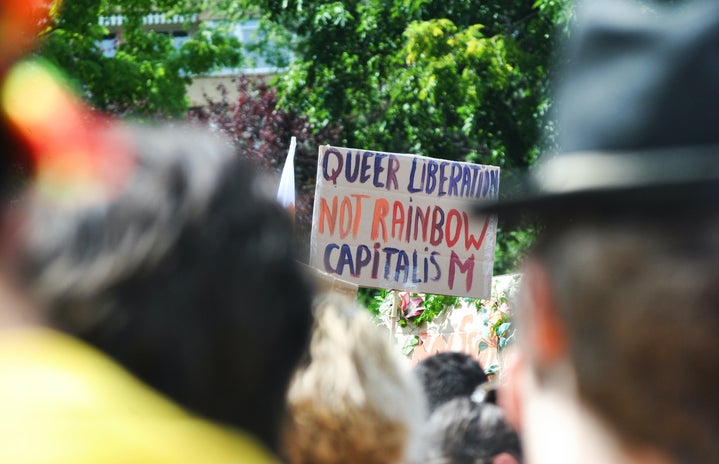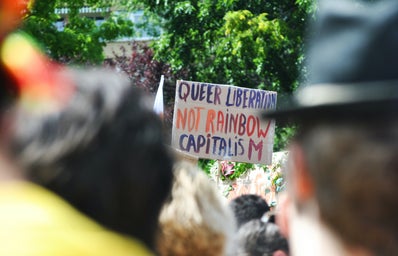Oh boy. Let’s have THIS conversation, and yes we are starting early, at least a month before Pride month. This article largely draws upon research I conducted and wrote for a college course I’m taking regarding companies ruining— excuse me—”participating” in Pride month. I hope the following research and commentary inspires important conversations and thoughts within your own space as we soon renter this time of rainbow capialism:
This research examines how companies’ motivations for participating in Pride month are widely exploitive and hypocritical in nature, as well as largely ineffectual in fostering positive change in the LGBTQ+ community and surrounding society. While Pride month is a time dedicated to LGBTQ+ visibility, activism and celebration, corporation’s release of branded products showcasing their “pride” and “allyship” are capitalistic and performative endeavors. Such products and advertisements are used for monetary gain by appealing to wide audiences and concern themselves with generating positive brand associations, without providing meaningful and effectual recognition and change for the communities they are profiting from. As a result of such exploitation and hypocrisy, LGBTQ+ communities celebrating Pride month are disheartened by the commodification of a time and space meant to support their existence, not their financial value. The Michael Kors 2019 #MKGO Rainbow campaign will be inspected as a typical example of corporate behavior during Pride month. This examination draws from existing empirical research while providing unique insights to critically assess the intentions and effects of corporations during Pride month.
As LGBTQ+ individuals are demonstrating to be the “fasted growing ‘minority’ segment” by spending at least 3.7 trillion dollars annually in the United States alone, conversations regarding brand involvement in consumer identity are more important than ever. While almost 9 out of 10 of LGBTQ+ Americans feel it is important for corporations to support LGBTQ+ equality, there is concern regarding displays of support being misguided, exploitative advertisements motivated by corporate greed. One illustration of this is company efforts in incorporating LGBTQ+ visibility into their products and advertisements are virtually limited to the month of June, paving the way for questions regarding the sincerity in their messaging. While the month’s meaning makes such advertisements topical, it also could prompt concern for corporations wanting to stay within a certain level of social acceptability when showcasing their support. A clear display of this superficial support is when “companies change their logos to rainbow coloured versions of the same on the 1st of June, changing it back as soon as the month ends”. There is also the question of who else these corporations are trying to satisfy. One study found that “heterosexual participants exhibited more positive attitudes toward the brand and advertisement than did LGBTQ participants”. This brings into question who the actual target audience of these messages are. Ad testing is widely relied upon, especially by multimillion dollar corporations generating ad campaigns hoping to retain similar value, therefore this reception may not come to their surprise, and instead be intentional.
Identity Theory offers a framework for understanding the exploitative and hypocritical nature of advertisements in promoting LGBTQ+ pride by showcasing it through their own beneficial and marketable perspective. In advertising, this theory suggests that consumers “respond best to advertising that provides content that reflects the consumer’s identity”, however advertisers often apply a “one size fits all” approach when including and targeting LGBTQ+ consumers. Often times, the “depiction of intimacy between two members of the same sex, usually male”, are used to identify with gay consumers. By limiting the representation of the spectrumed LGBTQ+ community to a few, easily identifiable presentations, the purpose of Pride month is undermined in preference for corporations curating quickly digestible messages and promotions.
This theory also helps advertisers understand the importance of who is communicating their message to the audience, and in turn, helps consumers understand who the audience is by the messenger that is chosen. One study found that advertisements with a LGBTQ-identified influencer “elicited more perceived credibility and less brand hypocrisy” among LGBTQ+ viewers, however a “non-LGBTQ influencer elicited more positive ad attitudes and behavioral tendencies among the cisgender heterosexual non-LGBTQ participants”. When looking at the Michael Kors 2019 #MKGO Rainbow campaign, a careful balance between both influencers is employed, possibly suggesting an effort to pander to audiences on both sides of the sexuality spectrum. The two main faces of the campaign are models Austin Augie, an openly queer man, and Bella Hadid, a straight woman. As audiences of this clothing brand have two individuals to generally identify with, the company can increase the number of members in their consumer base to connect with, and therefore gain profit from. Moreover, the product line’s design concept is based on the standard, rainbow flag meant to generally exhibit gay pride and alignment. While there are other flags with color variations in existence that connect with the other subdivisions in the LGBTQ+ acronym, it could be concluded that the use of the rainbow flag is meant to connect with as many individuals as possible without caring to provide deeper connection than what will sell. Overall, the campaign presents as a typical example of a company donning queer symbols as it benefits them with little consideration for who they are benefiting from.
While it is not expected that all advertisements to marginalized groups should harbor activist intentions, companies promoting products and capitalizing off of the LGBTQ+ community during a deeply meaningful month can be viewed as disrespectful and negatively impact the consumer’s perceptions of the brands. Issues within the gay community do not include not having enough rainbow-printed attire, but the disproportionate suffering of gay individuals at the hands of diesase, addiction, discrimination, and more. By not acknowledging these issues, and even worse being complicit or proponents of them, this negatively impacts the “consumer’s thoughts, impressions, and perceptions of a brand [that] are integral to the vitality of a company, organization, or entity”. Well known companies such as Amazon and Walmart have been subject to scrutiny in the past when their behavior was revealed to be performative and, worse, hypocritical. In 2021, “Amazon and Walmart donated huge sums [of money] to American politicians who voted against the Equality Act, while changing their logos to rainbows during pride month to garner profits from LGBTQ+ sentiments”. Any “allyship” they might have exhibited can be considered no more than a marketing strategy in an attempt to reach into the pockets of LGBTQ+ individuals at their own expense.
The research and interpretations presented are not meant to discourage or show a lack of support for companies in connecting with their LGBTQ+ audience and, when appropriate, receive benefits from it. It can be reasonable for a company to demonstrate meaningful and positive allyship, whether within or outside of Pride month, and have it lead to monetary gain when it is a byproduct of their actions. While Amazon and Walmart deceived their queer audience in June of 2021, Discord, an instant messaging platform that makes use of online chatroom servers, exemplified what it meant to be an allied corporation. During this month, “LGBTQ+ communities were subject to a wave of targeted hate” on the platform, which generated intervention from employees and volunteer moderators and resulted in “the communities that received the requested volunteer support having a better capacity to handle the issues”. This response from the company was for the benefit of their LGBTQ+ users, providing them with no immediate financial gain, only user satisfaction which is a general goal of any service. Any sort of gain Discord received for their actions was earned, not manipulated.
While leaders or those employed by companies participating in the rich marketing of Pride month could be honest proponents of LGBTQ+ equality, the companies themselves cannot function as such proponents. Their participation seeks financial benefit above any sort of positive societal change or recognition of the community that may come from their advertisements, despite their own claims. Even if some consumers feel appreciative of or relate to the messages depicted in the advertisements, companies moviations for showing allyship to the LGBTQ+ community is inherently exploitative and hypocritical, and fails to demonstrate true allyship by not using their platform to enact positive change for the community.


